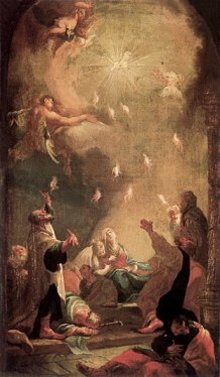The Fruit of the Spirit, Pt. 4: Love Without Restraint
Romans 5:8 says, "But God demonstrates his own love for us in this: While we were still sinners, Christ died for us."
Vacation was WONDERFUL!!! My family and I spent a week at the beach and it was great. I have a ton of pictures that I will be putting up later this week. The time away was much needed.
Here and there I was able to peruse some of the reaction from the SBC Annual Meeting. Let me just say that I am more than glad that I have decided to bow out of all of this. I will be limiting my involvement in SBC issues to being a contributing writer for the new SBCOutpost, which will be a group blog effort. Other than that, further participation appears to be pointless.
So, all of that brings me back to the point of my writing: to try and lift up the name of Jesus and to point out where I see God at work in the world around me. I have continued to think about the Fruit of the Spirit, so I wanted to start the week off with some further reflections on Love. We know that God is love. In Romans 5:8 listed above, we see how God demonstrates His love for us by having Christ die for us while we were still sinners. Before we had ever done anything good and while we were still completely stinking with sin, Jesus died for you and for me. It is hard for us to fully grasp that, because we become so convinced of our goodness and righteousness and we begin to feel that we somehow merit the merit of Christ. This is never more true than when we are judging others. Let me tell you a story to illustrate my point.
In the late 1990's, I was a young seminary student at Golden Gate Baptist Theological Seminary in the San Francisco Bay Area. My wife and I joined First Baptist Church, San Francisco, and from there started a ministry to homeless people. We used to meet with a team of other folks in their 20's on Sunday mornings really early. We started going to the Civic Center park, which bore the popular name of "Crack Park" for obvious reasons. Each Sunday morning, we would pass out sweet rolls, orange juice, and clean socks (homeless people love clean socks) to those who were just waking up on benches or under trees. This was right in the shadow of City Hall and the police and city leadership turned a blind eye to the wide stretch of homeless people laying in the plaza. We were their Sunday morning wake up call, and we would share breakfast with them, offer them prayer, and invite them over to a central place where we would share the Word of God with them. We saw several come to Christ through this and we began discipling them. It was a powerful time.
One Sunday morning I was walking around the park and I was trying to give away the food and bless people through prayer and/or friendliness. Then, I saw the most disgusting sight I had ever seen in a human being. Before me lay a black man who was a homeless transvestite. He had partial make up on with a half grown beard. He was a mess and could not keep himself up. He had his shoes off and his feet were swollen and were oozing pus from open sores. From his body emanated a stench that was nauseating. Actually, I found myself gagging at the sight of this "man", rejected by both the straight and gay community. He was a complete horror show. As I gagged from the sight, smell, and aura of this he/she who was clearly very ill, I knew that I could not turn away. I was being overwhelmed by my own precious sensibilities and I wanted to run, but I knew that was wrong. I wish that I could say that I was just SO compassionate. But, I wasn't. I didn't know what to do.
So, in that moment, I decided that prayer was the answer. I cried out to God and I asked Him to let me see that man the way that He saw him. Immediately, I was flooded with love and warmth. Tears came to my eyes and my heart broke for the man. I saw him as a child of God, broken and bent, but still bearing God's image upon himself. I was overcome by the love of God for him. I don't know if I remember a prayer ever being answered so quickly. I realized that God loved this man so much, that while he was still in his sin, Christ died for him. Love flowed out of me as well. I walked over to the man, offered him something to eat, told him that Jesus loved him and died for him, and then I hugged him. The man was receptive and opened up to me. I wish I could report some miracle regarding the man, but the real miracle happened in my heart. As I experienced God's love for this man who was filthy with sin, my own heart was changed and I felt myself experience brokenness over his alienation from God. I was overwhelmed with God's grace that was available for this man. I was overwhelmed with God's love.
What kind of God do we serve who could love sinners? What kind of God is it that demonstrates His love by dying for us while we are still lost in our sin? If God has forgiven us this way, then who are we to not forgive others? How can we push someone else aside when God has given all to bring us back to Himself? And, having experienced this for ourselves, how can we not extend it to others?
Ephesians 3:17-19 "And I pray that you, being rooted and established in love, may have power, together with all the saints, to grasp how wide and long and high and deep is the love of Christ, and to know this love that surpasses knowledge—that you may be filled to the measure of all the fullness of God."











